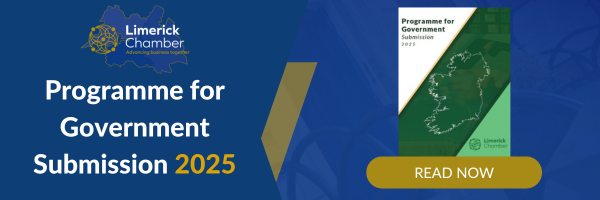Intensified competition between Irish airports over passengers and airlines will have severe consequences for economic activity and jobs outside the Greater Dublin Area, a report by international economic consultants has warned.
The report by Denmark’s Copenhagen Economics found that significant capacity expansion planned for Dublin Airport will make it very difficult for other airports to maintain current routes and passenger levels. It also means that other airports will not be able to act as a catalyst for regional growth as foreseen in Project Ireland 2040 and the Regional Enterprise Plan.
The report was commissioned by Limerick Chamber and supported by Shannon, Ennis and Galway Chambers in response to the need for enhanced direct air connectivity into the regions to support business and, not least, foreign direct investment. Titled, ‘The Assessment of aviation policy as a driver of economic development in the West and Mid-West of Ireland’, the report focuses largely on the challenges around growing the key gateway airport for the Mid-West and West, Shannon Airport. It was presented to government and Oireachtas members from the regions today.
It calls for a roadmap for more balanced growth in the regions that builds on a closer integration of aviation policy with enterprise policy. In addition, the report calls for initiatives (below) to improve Shannon Airport’s global connectivity.
The report raises serious concerns surrounding the impact of Brexit, given that the western seaboard will be without any daily EU hub airport connectivity post Brexit. Shannon Airport’s Heathrow services are currently the only direct EU flights daily from the region. Opening new routes in a post-Brexit environment will be vital, it finds, to fuel growth in the Mid-West and West.
Copenhagen Economics analysed the economic impact of several selected strategically important routes and found that a frequent business connection to Frankfurt Airport, involving two flights every weekday and one flight per weekend day, would add the greatest potential contribution to the economy with additional GDP of €412 million.
The report is framed against a backdrop of Dublin Airport increasing its share of the total number of passengers travelling through Ireland from 73 per cent in 2005 to 86 per cent in 2018. “Even in an international context, the increasing dominance of Dublin Airport at the expense of other Irish airports is striking,” the report reads. “Other small open economies, where a similar concentration in market shares has been seen, have implemented policy initiatives to counteract the dominance of the national airport and mitigate negative impacts on other airports.”
It continues: “The sustainable development of Shannon Airport is a vital cog in the wheel of balanced regional growth that is at the heart of Project Ireland 2040. The global connectivity that is a necessary condition for such growth can only be achieved through a vibrant regional airports network that can serve as a counterbalance to the increasingly congested Dublin Airport.”
The report places strong focus on the need to strengthen services in the context of the importance of ICT, engineering and medical technology in the region, with access to connectivity in the region particularly important for all three. A recent survey of 16 FDI announcements in the Mid-West in 2016, for example, found that each company involved cited Shannon Airport as a factor in their investment location decision. “If the sustainability of Shannon Airport is not secured, there is a risk that regional growth in Ireland will be even more unbalanced and that the National Planning Framework will be unsuccessful in reaching the growth targets for the West and Mid-West.
Recommendations set out in the report are:
- The Department for Transport, Tourism and Sport should assess the costs and benefits of increasing the number of Irish airports eligible for state aid and compare them to alternative policy instruments to secure balanced regional growth. This would allow airports outside Dublin to compete on more equal terms and improve the business case for opening new routes out of Shannon and Cork airports
- The Department of Transport, Tourism and Sport should examine the costs and benefits of implementing a national route development fund to support the delivery of strategic FDI routes in airports outside of the Capital
- The Department of Transport, Tourism and Sport should commission an updated capacity review study that analyses the capacity of the airport network as a whole and makes recommendations in line with Project Ireland 2040 goal of balanced regional development
- The Commission for Aviation Regulation should give due regard to the goals of Project Ireland 2040 when making its maximum airport charge determination for Dublin Airport
- Furthermore, the CAR should ensure that the independent slot coordinator takes existing airport capacity elsewhere in the country into account when allocating slots at Dublin Airport
- The Department for Business, Enterprise and Innovation should more actively use aviation policy to achieve their ambition of balanced regional growth
- Tourism Ireland should consider allocating a larger share of the funding to market tourist destinations outside Dublin and promote alternative routes
- Regional actors should collaborate to develop a smart specialisation strategy that builds on inherent strengths and helps alleviate growth constraints in the West and the Mid-West
- Shannon Airport should ensure that its operational processes and infrastructure continue to be efficient



